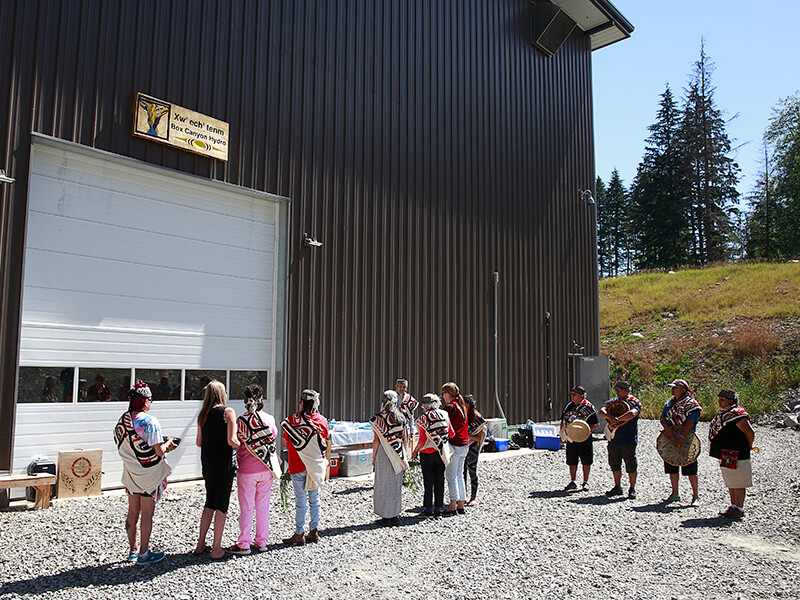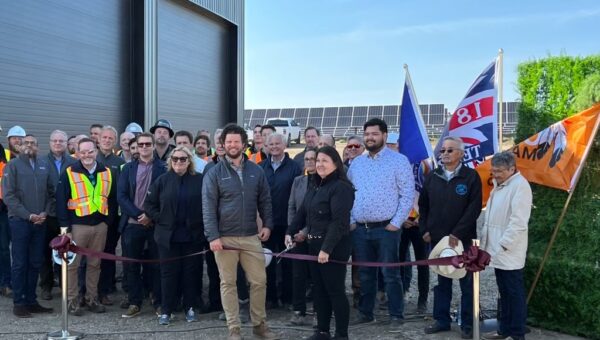Article: “Clean Energy gets warm welcome from First Nations”
Source: Vancouver Sun
Written By: Paul Kariya, Executive Director, Clean Energy BC
Last week, I attended the ceremonial opening of the Box Canyon Hydro Project near Port Mellon, B.C. It was a joyful but also a serious and thoughtful event hosted by Elemental Energy, a Vancouver-based renewable energy developer that built the project in partnership with the Squamish First Nation.
Under the beat of drums and a sacred song, Squamish women elders ceremonially cleansed the project of any ill thoughts, sentiments, spirits and negativity, while blessing it for a long and prosperous operation.
This was the ultimate in insurance for a project that should operate for a long time, maybe 60 to 75 years, and deliver enough power for about 4,500 homes.
Box Canyon is a 16 MW run-of-river hydro project with a 40-year contract to sell power to BC Hydro. This is the private sector working in a complementary manner with the public sector, BC Hydro, in clean and renewable electricity production. While this is a small clean energy project, it is still a marvel of engineering, converting high headwater flow into useable energy. Even as a small project, the capital expenditures are significant, in the high tens of millions of investment dollars. The project completion and operational risk transfer is to the private sector. The jobs and investments were largely local to the First Nation, local communities and other regions of B.C. The power was procured in a cost-effective manner via an open and competitive call for power. There were no subsidies involved.
We as ratepayers benefit, and we as taxpayers benefit too (public debt was not used). We in B.C. are very good at doing these clean and renewable projects. As well as the developers and operators, we have a supply chain that is experienced and possess the know-how to do this — the contractors, legal teams, financiers, environmental consultants, etc. These projects are a model for what we do well in B.C.
There were also no First Nation protests or blockades.
First Nations will receive jobs and contracts and also benefit from royalties from the developer and revenue sharing from the provincial government. We learned at the ceremony that the Squamish First Nation is now involved in nine such projects in their territories.
The Squamish were a wealthy people in a wealthy land, and will once again benefit from the natural resources that have sustained their culture and identity as a people.
They have embraced economic development like clean and renewable energy projects that will provide revenue for their government and necessary public services — schools, education, recreation, cultural services and roads etc. Previously, the wealth came from fishing, hunting and trade based on natural resources. The economic underpinnings of government still come from the land and natural resources.
The Squamish embrace clean and renewable energy projects because they meet their principles — protect the environment, build legacy infrastructure, and enable sustainable economic development.
Two weeks ago, I witnessed a similar opening ceremony at Culliton Creek Hydro with BluEarth Renewables and the Squamish Nation. Next week, I will attend the opening of Tretheway Creek Hydro with Innergex Renewables and the Coast Salish Nations of Sts’ailes and Douglas.
These projects were all awarded contracts from BC Hydro under the 2008 Clean Power Call. But soon, the last of these will have been completed. Are there more coming? Will B.C.’s climate action plan 2.0 provide positive direction for more electrification? Will economic reconciliation with First Nations continue to include clean energy hydro, wind, solar, biomass and other renewable projects?
B.C. can unlock more of these opportunities through aggressive policies toward greater use of electricity to power how we live. This is the kind of climate leadership we need and what we saw recently in commitments from Canada, the U.S. and Mexico.
Paul Kariya is executive director of Clean Energy B.C.


